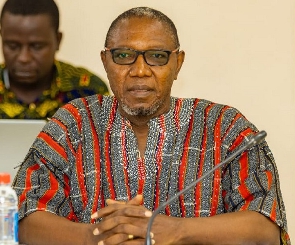 Deputy Ranking Member on the Education Committee of Parliament, Dr. Clement Abas Apaak
Deputy Ranking Member on the Education Committee of Parliament, Dr. Clement Abas Apaak
Dr. Clement Abas Apaak, the Member of Parliament for Builsa South and Deputy Ranking Member on the Education Committee of Parliament, has endorsed former President Mahama’s decision to review the Free Senior High School (SHS) programme and cancel the teacher licensure examination for evaluating teachers nationwide.
According to the MP, all stakeholders in Ghana's education sector are in favour of reevaluating the Free SHS programme and discontinuing the teacher licensure examination.
Figures like President Nana Addo Dankwa Akufo-Addo, Vice President Dr. Mahamadu Bawumia, Hon Ntim Fordjour, and the NPP government appear resistant to these changes, however.
Dr Apaak asserted that the promises made by John Dramani Mahama are sensible, justified, and will be implemented once he assumes the presidency.
He made these remarks in response to Deputy Minister of Education, Mr John Ntim Fordjour's criticism of the former president, where Mr Fordjour described Mahama as the most significant threat to Ghana's progress.
Dr Apaak argued that Mr Fordjour and the NPP government either lack an understanding of public sentiment or are out of touch with reality.
He reiterated his support for Mahama's proposed education policy reforms, emphasising the need for a comprehensive review to address the challenges within the education sector.
Below is the full statement:
JM's Promises To Review fSHS and To Cancel Teacher Lincensure Examination Make Sense
Every stakeholder in education in Ghana is in favour of reviewing the fSHS programme and the cancellation of the Teacher Lincensure examination, but NADAA, DMB, Hon. Fordjour and the NPP gov't.
The promises made by JM are commonsensical, justified and will be implemented when he takes over as President.
Hon. Fordjour and the NPP gov't are either out of touch with reality or haven't followed public sentiments.
If JM has plans to cancel fSHS he wouldn't be planning to invite stakeholders to a national forum to discuss fSHS.
JM has on several occasions said that fSHS has come to stay. Like most Ghanaians however, he is concerned about the well documented implementation challenges and how to address them to make the fSHS better for national good.
Ghanaians of all walks of life are calling for a review of the fSHS policy, which has been implemented for over six years, and JM will honour this call because the fSHS programme is challenged by: erratic academic calendar; inadequate and unwholesome food; inadequate academic and residential space; overworked teaching and non-teaching staff amongst others.
Equally, JM's proposed forum on fSHS will also consider the role of PTA's and private secondary schools in the delivery of the policy.
JM is not opposed to examining teachers as a basis of certifying them as professionals.
However, like teacher trainees and stakeholders in teacher training, JM is opposed to the current arrangement towards certification.
His reasonable alternative is to make the examination towards professional certification a final-year compulsory course to be written alongside other final-year courses.
In JM's variant, when a teacher trainee passes all final year courses, including the course tailored to certify a trainee as a professional teacher, the trainee is given a licence.
If the trainee passes all courses but fails the certification course, he/she doesn't get a licence and would have to re-register the course and write it in his/her college as is the case with final year compulsory courses.
This mode of teacher certification in addition to JM's promise to cancel the one-year compulsory national service, which is currently an additional requirement for appointment as a teacher by the Ghana Education Service, has additional advantages.
Under JM's proposal, teacher trainees who pass all courses, including the certification course, are immediately posted to the classroom; no wasting a year doing national service and no need to pay, after national service, to write a licensure examination.
We can certify our teacher trainees to professional teachers and deploy them in the classrooms sooner, where they are most needed, through a cheaper, simplified yet rigorous process.
Dr Clement Abas Apaak
MP, Builsa South and Deputy Ranking Member On the Education Committee of Parliament.